Is Christmas shopping by smartphone just two taps away?
- Published
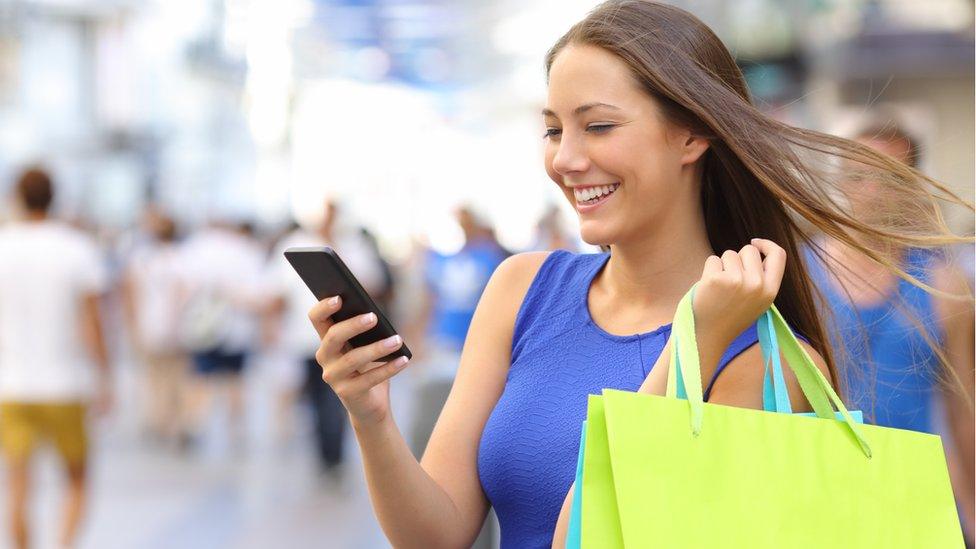
Will one-tap smartphone shopping boost online sales?
Buying online with just a few taps of a mobile phone is the dream of the lazy Christmas shopper.
But the smartphone - wonderful as it is for many things - is not that great for shopping online.
Yes, we can use it as a digital wallet to pay for things in shops, search online and browse catalogues, but when it comes to the buying online bit, mobile comes up short.
For most of us, it's just too fiddly tapping in credit card numbers, names, billing and delivery addresses.
The figures bear this out. More than 90% of us abandon our online shopping baskets or carts when attempting to buy something on mobile, compared to about 68% shopping via desktop or tablet, external.
Online sales in the US and Europe total about £360bn ($582bn; €426bn). Of these, 10% are made via smartphone in the US; the figure is 7% in Europe, according to the Centre for Retail Research, external.

Madrid, Spain: Shopping online helps us avoid Christmas crowds like these
"As a brand we don't do anywhere near well enough," admits James Gold, co-founder of fashion accessories brand, Skinny Dip.
"About 15% of our traffic comes from mobile, but the conversion rate relative to desktop and tablet is so much lower. We know we have to make mobile a much better shopping experience."
So what's the solution?
Digital tags
Dan Wagner, founder of Powa Technologies, believes his company has built a platform that makes smartphone shopping much easier.
"We've created a new type of e-commerce platform that allows you to wave your phone over a product or image, tap your phone and buy without filling in lots of forms," he tells the BBC.
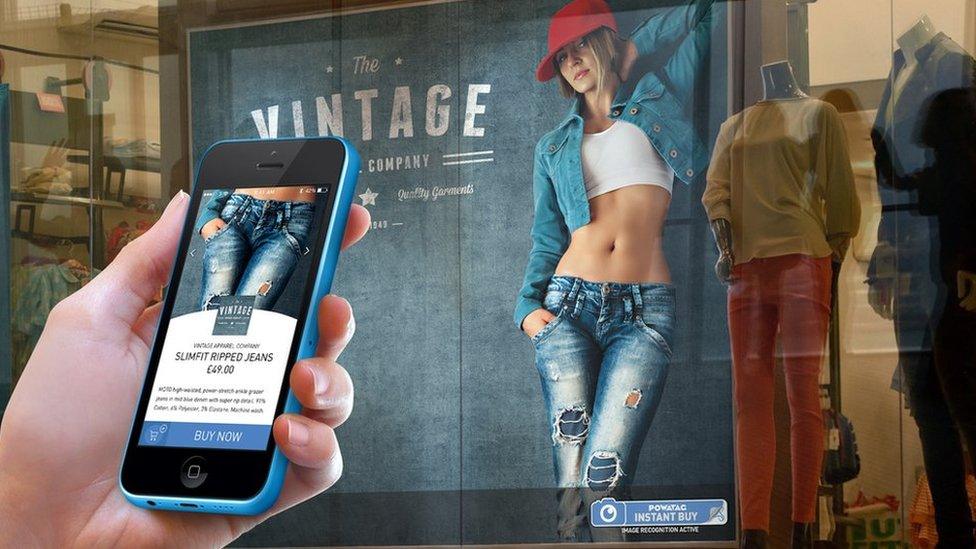
Powa Technologies has launched ad recognition to its smartphone shopping platform
"We are transforming commerce and advertising."
The PowaTag system relies on digital tags, like traditional quick response (QR) codes, that can be inserted into emails, websites, posters, images - even the audio from TV ads, Shazam-style, external.
Shoppers download the app, set up an account and store their payment cards. Then wherever they see the PowaTag symbol they can buy the product by scanning it with their phone and tapping the "buy now" button.
Mr Wagner says 1,200 brands and retailers around the world have signed up to the platform, including L'Oreal USA, Carrefour and Samsonite.
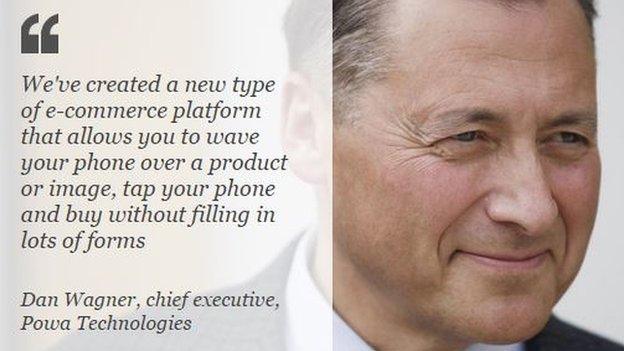
The firm has just launched an advert image recognition facility for the app - take a photo of the ad and then buy the product. It is also working on video recognition, so shoppers could buy products being showcased in online video ads or video blogs.
But until it flexes its marketing muscles and signs up a lot more retailers it is in danger of remaining a niche product. And the fact that there is no directory of PowaTag-enabled retailers is a serious oversight.
The way of Zen
Of course, Amazon has already successfully established one-click ordering for account holders, which is fine if you're happy to do all your shopping there.
But if you want more variety, you're back to the same problem of cumbersome registration and form-filling at other websites.
Unless you use an app like Zen Shopping.
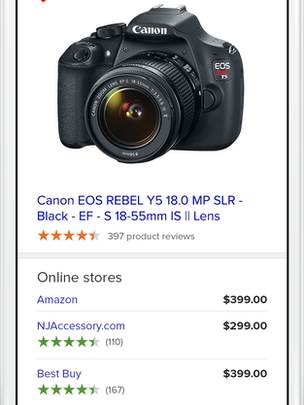
The US-based Zen Shopping app compares product prices and offers quick-tap shopping
It offers one-tap checkout at more than 100,000 stores - including Amazon and Walmart - and claims the biggest inventory of goods in the world.
You can compare prices and if the product you've just bought could be found cheaper elsewhere, it will let you know if you are entitled to a refund.
Its drawback - there always seems to be one - is that it is only available to US Apple iPhone users.
But the company says an international version is coming "soon" as well as a version for Android phones.
Worldwide wallet
PayPal has successfully simplified the payment process, but not all retailers accept it.
And the same goes for digital wallets like Apple Pay - not much use if you don't have an iPhone or the retailer doesn't yet accept it. Google Wallet, by most accounts, hasn't been a rip-roaring success after four years.
But what if you had a secure digital wallet that worked everywhere?
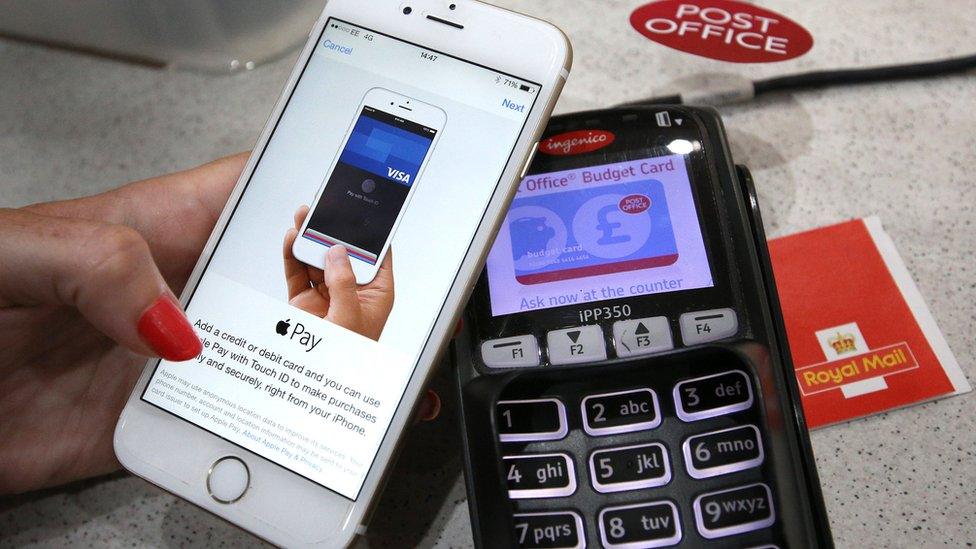
Pay-by-phone app Apple Pay is good for iPhone users, but what about everyone else?
Dashlane, a tech company with offices in Paris and New York, believes it offers just that. It manages all your passwords, credit and debit card numbers, phone numbers, billing and delivery addresses in one encrypted app.
Three-quarters of its four million users worldwide use it as a more convenient way of handling the checkout process when making online purchases, chief executive Emmanuel Schalit tells the BBC.
The main advantage from the retailer's point of view is that there's no point-of-sale technology to install - all the encryption takes place within the app or web browser extension.
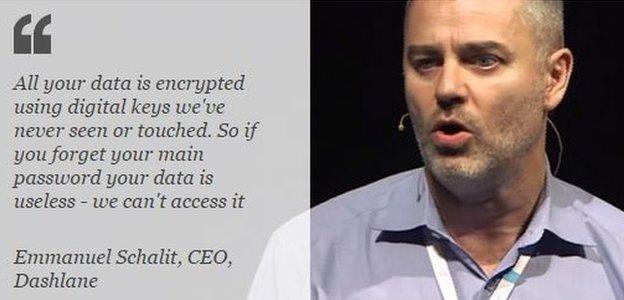
And for shoppers understandably wary about hackers stealing credit card details, the fact that all such data is kept in encrypted form on the app or browser extension, and not on retailers' servers, gives an added layer of security.
"All your data is encrypted using digital keys we've never seen or touched," says Mr Schalit.
"So if you forget your main password your data is useless - we can't access it. Which, actually, is a good way to convince people that their data is safe."
Dashlane has facilitated $4bn (£2.6bn) of transactions so far, he says. And the app has the added advantage that it works with all payment methods and all retail websites.
Mobile loyalty
Smartphone shopping is on the rise, despite the difficulties, says Andy Mulcahy of IMRG, the online retail association.
Over the Black Friday weekend in November, UK shoppers spent £3.3bn online - about £472m via smartphones, compared to about £1bn on tablets.
"Increasing sales growth through smartphones has been a feature of the past year," says Mr Mulcahy.
"It's likely this jump was due to the nature of these discount events - people receiving emails on their phone and jumping straight in so as not to miss out on the deals."

Powa's audio recognition capability echoes that of music site Shazam
But retailers are still playing catch-up when it comes to smartphone shopping - research from Foolproof reveals that half of shoppers would happily switch from plastic to digital loyalty cards, for example.
Special offers sent to phones tend to get a good response - we like the convenience and immediacy.
So once they crack the online purchasing part, sales via mobile should go through the roof.